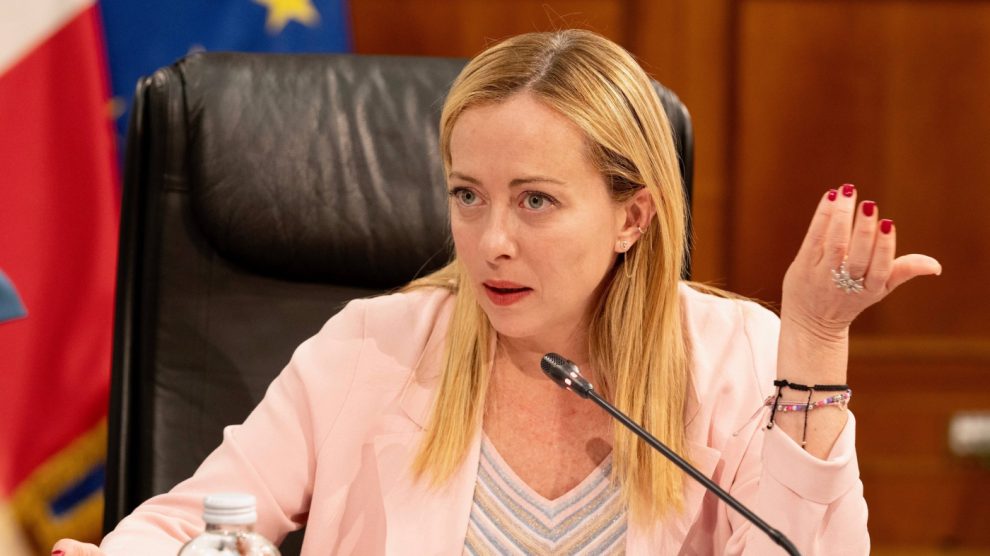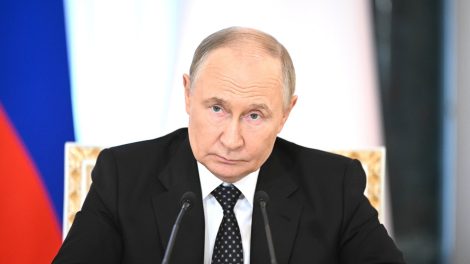Giorgia Meloni is Tunis-bound. The Italian Prime Minister is expected to travel to the Tunisian capital on Tuesday, looking to unlock stalled negotiations between President Kaïs Saïed’s government and the International Monetary Fund. He had invited her on Friday, when the two spoke over the phone, touching upon that issue as well as bilateral relations (including in energy and investments) and migratory flow management.
- PM Meloni had met with IMF Director Kristalina Georgieva and EU Commission President Ursula von der Leyen on the sidelines of the G-7 summit in Hiroshima. That trilateral underscored Rome’s commitment to advance the matter…
- … as confirmed by Tunisian Foreign Minister Nabil Ammar, who on Friday acknowledged Italy’s “understanding of the need to support the political correction and economic recovery underway.”
A step back. The IMF is refusing to greenlight a nearly $2 billion loan, fleshed out in October with a preliminary agreement, as it awaits progress on fiscal reforms to make the country’s financial growth more sustainable – and make sure that the loan, intended to address the country’s deep economic crisis, works as intended in the longer term.
- However, President Saïed is resisting the reforms – referring to them as “diktats” and “tantamount to lighting a match next to a high explosive” – as it fears social blowback. On Saturday, he suggested taxing the richer citizens instead.
- Meanwhile, credit agencies are warning that Tunisia faces a possible default on its sovereign debt.
Meanwhile: migration. Looking from across the Mediterranean Sea, one of the most evident repercussions of Tunis’ predicament is the flare-up in migrant numbers. Of the 50,000 that have reached Italian shores since the year began, more than half had departed from the Tunisian coast.
- That’s one of the reasons why Italy’s Interior Minister Matteo Piantedosi, during his recent visit to Tunis, worked to increase cooperation with local authorities, including by supplying land vehicles and training the Tunisian Coast Guard to boost its ability to intercept departing migrants.
- A large number of them travel to Tunisia from sub-Saharan African nations, pushed away by ongoing regional crises such as the civil conflict in Sudan.
- As for the longer term, however, European countries (which are currently discussing a new migration pact) are keenly aware that only boosting a just economic development can really address Africa’s instability.
Pragmatic development. As the Italian Defence Minister, Guido Crosetto, recently remarked, stability is the foundation of peace, economic growth and the reduction of inequalities – and to achieve those objectives, “we must help countries where this stability does not exist.” “We need to help the Global South grow without imposing democracy but ensuring that it grows at its own pace and through its own processes, guaranteeing stability. The evolution of those countries will eventually lead to their self-determination.”
- That’s also true for Tunisia – which is why PM Meloni, speaking at the G-7 Summit in Hiroshima, had criticised the IMF’s rigid stance. “We need a pragmatic approach because otherwise, we risk worsening situations that are already compromised,” she stressed.
- According to Minister Crosetto, the West’s exceedingly bureaucratic perspective is at fault. “Since Tunisia is not as quick as we would like in adjusting its models to ours, which is already an assumption, we are not helping them. By not doing so, we are placing Tunisia in the hands of China and Russia.”
Spearheading change. Circling back to PM Meloni’s upcoming visit, one can rest assured that she will remark on the urgent need to deliver financial aid to Tunisia. In parallel, the Italian leader will likely offer support in terms of personnel, means, and investigative cooperation in the fight against human traffickers, as well as legal entry quotas for migrants (with on-site training).
- Finally, she’ll look to offer new investment commitments and partnership agreements as part of Rome’s upcoming energy investments Mattei Plan – which amounts to Italy’s strategy for boosting long-term regional growth.
- As Minister Crosetto told Libero on Monday, the PM aims to make Rome the spearhead of an ambitious, EU-supported growth plan. “Italy alone cannot do it, but we are the only ones trying to do it. We are sowing this idea in all the meetings we have at the international level, and little by little, it is taking root. All African countries have grasped it and are looking at us with attention and respect.”




